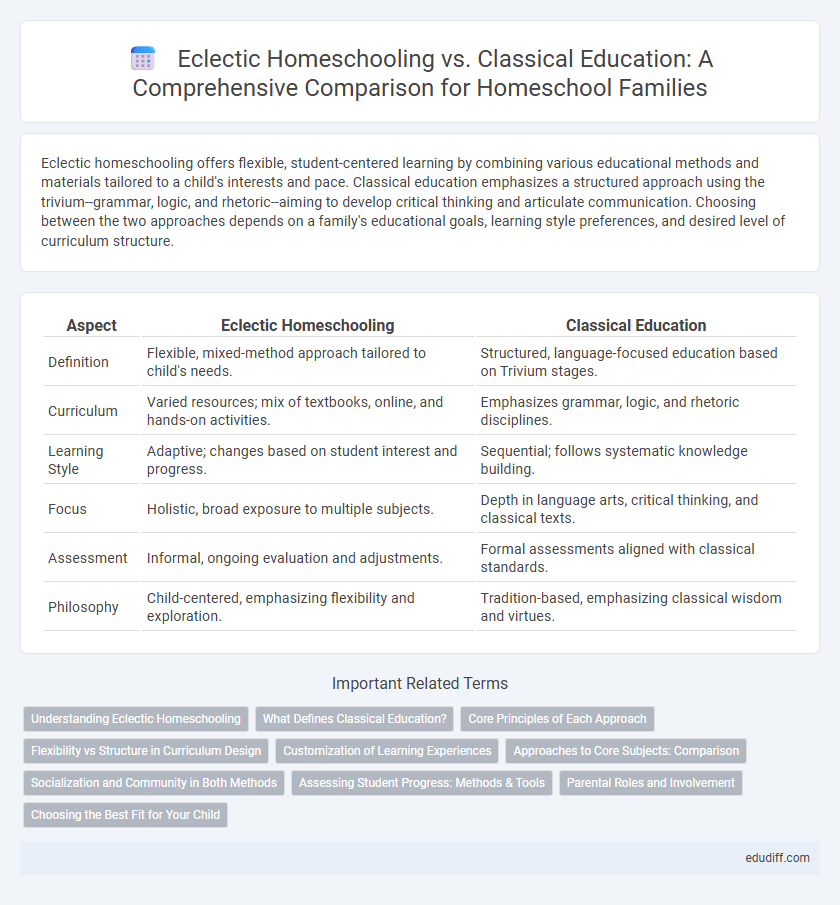Eclectic homeschooling offers flexible, student-centered learning by combining various educational methods and materials tailored to a child's interests and pace. Classical education emphasizes a structured approach using the trivium--grammar, logic, and rhetoric--aiming to develop critical thinking and articulate communication. Choosing between the two approaches depends on a family's educational goals, learning style preferences, and desired level of curriculum structure.
Table of Comparison
| Aspect | Eclectic Homeschooling | Classical Education |
|---|---|---|
| Definition | Flexible, mixed-method approach tailored to child's needs. | Structured, language-focused education based on Trivium stages. |
| Curriculum | Varied resources; mix of textbooks, online, and hands-on activities. | Emphasizes grammar, logic, and rhetoric disciplines. |
| Learning Style | Adaptive; changes based on student interest and progress. | Sequential; follows systematic knowledge building. |
| Focus | Holistic, broad exposure to multiple subjects. | Depth in language arts, critical thinking, and classical texts. |
| Assessment | Informal, ongoing evaluation and adjustments. | Formal assessments aligned with classical standards. |
| Philosophy | Child-centered, emphasizing flexibility and exploration. | Tradition-based, emphasizing classical wisdom and virtues. |
Understanding Eclectic Homeschooling
Eclectic homeschooling blends multiple teaching styles and curricula tailored to a child's unique learning preferences, combining elements from classical education, Montessori, Charlotte Mason, and unschooling methods. This flexible approach encourages parents to select resources that best suit their child's interests and developmental needs, promoting a personalized and engaging learning experience. By focusing on adaptability and varied educational materials, eclectic homeschooling supports well-rounded intellectual growth and fosters independent critical thinking skills.
What Defines Classical Education?
Classical education is defined by its structured approach centered on the trivium, comprising grammar, logic, and rhetoric stages that guide students through foundational knowledge, critical thinking, and expressive skills. This method emphasizes studying classical languages like Latin and Greek, as well as engaging with classic literature and historical texts to develop a deep understanding of Western civilization and intellectual traditions. The disciplined, sequential learning model of classical education fosters analytical reasoning, eloquent communication, and a lifelong love of learning.
Core Principles of Each Approach
Eclectic homeschooling integrates multiple teaching methods and curricula tailored to a child's learning style, emphasizing flexibility and personalized education. Classical education centers on the Trivium -- grammar, logic, and rhetoric -- nurturing critical thinking and mastery of foundational knowledge through a structured, sequential approach. Both prioritize a strong foundation in reading, writing, and arithmetic, but eclectic homeschooling adapts dynamically, while classical education follows a disciplined, time-tested framework.
Flexibility vs Structure in Curriculum Design
Eclectic homeschooling offers significant flexibility by allowing parents to customize curriculum choices based on a child's learning style and interests, integrating various educational methods and resources. In contrast, classical education emphasizes a structured and disciplined approach with a focus on the trivium stages--grammar, logic, and rhetoric--ensuring a systematic progression in critical thinking and language skills. Families seeking adaptability prioritize eclectic homeschooling, whereas those valuing a rigorous and cohesive framework often prefer classical education.
Customization of Learning Experiences
Eclectic homeschooling offers unparalleled customization by blending various educational philosophies, allowing parents to tailor curricula to their child's unique interests, strengths, and learning pace. Classical education follows a structured framework rooted in the trivium--grammar, logic, and rhetoric--providing a rigorous progression but less flexibility in subject matter adaptation. This personalized approach in eclectic homeschooling fosters diverse, student-centered learning experiences compared to the more standardized path of classical education.
Approaches to Core Subjects: Comparison
Eclectic homeschooling combines diverse methods and resources, tailoring core subjects like math, science, and language arts to a child's interests and learning style, whereas classical education follows a structured, chronological approach centered on the trivium--grammar, logic, and rhetoric. In classical education, mastery of foundational facts and critical thinking skills develops progressively through clearly defined stages, while eclectic homeschooling adapts curriculum flexibility to emphasize experiential learning and student choice. Both approaches aim for academic proficiency but differ in rigidity and pedagogical focus, with classical education rooted in tradition and eclectic homeschooling embracing a personalized, interdisciplinary framework.
Socialization and Community in Both Methods
Eclectic homeschooling offers diverse socialization opportunities by integrating various teaching styles and allowing flexibility in community engagement, fostering interactions across multiple social settings. Classical education emphasizes structured social development through Socratic discussions, group recitations, and participation in classical studies communities, promoting disciplined social interaction. Both methods prioritize community involvement but differ in approach, with eclectic homeschooling encouraging broader, varied social experiences and classical education focusing on cohesive, tradition-based social frameworks.
Assessing Student Progress: Methods & Tools
Eclectic homeschooling assesses student progress through diverse methods such as portfolio reviews, standardized tests, and personalized performance evaluations tailored to individual learning styles. Classical education emphasizes mastery of the trivium--grammar, logic, and rhetoric--using formal assessments like oral recitations, written essays, and periodic examinations to track comprehension and critical thinking skills. Both approaches utilize digital tools, progress trackers, and parent-led evaluations to ensure consistent academic growth and skill development.
Parental Roles and Involvement
Eclectic homeschooling offers parents the flexibility to tailor curricula by combining diverse educational resources, requiring active involvement in selecting and adapting materials to their child's unique learning needs. In contrast, classical education demands a more structured parental role, guiding children through the Trivium's stages--grammar, logic, and rhetoric--often involving direct instruction and monitoring progress closely. Both approaches emphasize parental engagement but differ in the balance between curriculum customization and adherence to a traditional framework.
Choosing the Best Fit for Your Child
Eclectic homeschooling offers a flexible, personalized approach by combining various teaching methods tailored to a child's unique learning style, while classical education emphasizes a structured, rigorous curriculum centered on the trivium stages: grammar, logic, and rhetoric. Parents should assess their child's temperament, academic needs, and long-term goals to determine which model aligns best with their learning preferences and family values. Balancing adaptability and discipline ensures an educational path that fosters both engagement and intellectual growth in a homeschool environment.
Eclectic Homeschooling vs Classical Education Infographic

 edudiff.com
edudiff.com